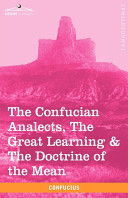The Great Learning (大學)
古之欲明明德於天下者,先治其國;欲治其國者,先齊其家;欲齊其家者,先修其身;欲修其身者,先正其心;欲正其心者,先誠其意;欲誠其意者,先致其知,致知在格物。物格而後知至,知至而後意誠,意誠而後心正,心正而後身修,身修而後家齊,家齊而後國治,國治而後天下平。自天子以至於庶人,壹是皆以修身為本。其本亂而末治者否矣,其所厚者薄,而其所薄者厚,未之有也!此謂知本,此謂知之至也。
Notes:
[Translation] The ancients who wished to illustrate illustrious virtue throughout the kingdom, first ordered well their own states. Wishing to order well their states, they first regulated their families. Wishing to regulate their families, they first cultivated their persons. Wishing to cultivate their persons, they first rectified their hearts. Wishing to rectify their hearts, they first sought to be sincere in their thoughts. Wishing to be sincere in their thoughts, they first extended to the utmost their knowledge. Such extension of knowledge lay in the investigation of things. Things being investigated, knowledge became complete. Their knowledge being complete, their thoughts were sincere. Their thoughts being sincere, their hearts were then rectified. Their hearts being rectified, their persons were cultivated. Their persons being cultivated, their families were regulated. Their families being regulated, their states were rightly governed. Their states being rightly governed, the whole kingdom was made tranquil and happy. From the Son of Heaven down to the mass of the people, all must consider the cultivation of the person the root of everything besides. It cannot be, when the root is neglected, that what should spring from it will be well ordered. It never has been the case that what was of great importance has been slightly cared for, and, at the same time, that what was of slight importance has been greatly cared for.
Folksonomies: philosophy sinology
Taxonomies:
/family and parenting (0.692993)
/science/medicine/surgery (0.382596)
/health and fitness/incest and abuse support (0.321731)
Keywords:
hearts (0.917596 (neutral:0.000000)), illustrious virtue (0.863123 (positive:0.332952)), thoughts (0.798925 (negative:-0.054744)), knowledge (0.787658 (positive:0.327405)), families (0.748414 (negative:-0.463830)), states (0.745248 (negative:-0.280846)), Great Learning (0.741974 (positive:0.532836)), persons (0.737657 (negative:-0.491467)), utmost their knowledge (0.685887 (positive:0.315293)), slight importance (0.671643 (neutral:0.000000)), knowledge lay (0.623695 (positive:0.339517)), great importance (0.592650 (positive:0.352370)), kingdom (0.348251 (positive:0.461384)), things (0.340924 (positive:0.065196)), root (0.327098 (negative:-0.544779)), ancients (0.211050 (positive:0.332952))
Concepts:
Agriculture (0.949847): dbpedia | freebase | opencyc
Cultivation (0.908297): dbpedia
Son (0.893128): dbpedia | freebase
People (0.858968): dbpedia | freebase
Person (0.793338): dbpedia | freebase | opencyc
Confucius (0.770096): dbpedia | freebase | yago
Family (0.757730): dbpedia | freebase
Order (0.742950): dbpedia | freebase






